VAC's and Certification Courses
Value Added Course - Firearms and Ammunition
Date: 19 to 24 July 2025
A 30-hour Value Added Course on Firearms and Ammunition was conducted for III Semester FSCRBC students, offering a strong foundational understanding of forensic ballistics that is highly relevant for V Semester Forensic Science students exploring advanced forensic topics. The course covered the structure and operation of firearms, classification of ammunition, and forensic techniques for collecting and analyzing ballistic evidence. Students were also introduced to the principles and procedures of gunshot residue (GSR) analysis. This initiative bridged theoretical concepts with practical applications, encouraging scientific thinking and preparing students for future roles in crime scene investigation and law enforcement.
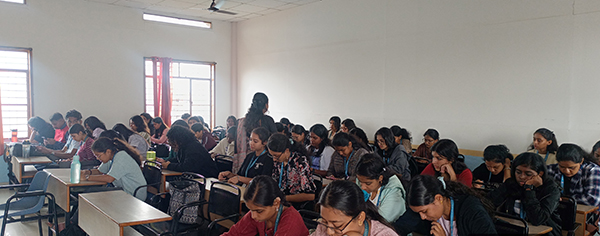
Value-Added Course on "Research Writing and Publication"
Date: 10 to 15 July 2025
The Department of Forensic Science organized a Value-Added Course (VAC) titled "Research Writing and Publication" from 10th to 15th July 2025 for the III Semester M.Sc. Forensic Science students. The course was conducted in Room M412, Main Block, 4th Floor and aimed to equip students with essential skills in academic writing and the research publication process.
The sessions were conducted by faculty members who guided the students through various aspects of research writing. Key topics included the types and structure of academic writing, with focus on diction, tone, sentence construction, punctuation, and logical coherence. Students were trained in the complete research writing process, from gathering information and creating bibliographies to drafting and formatting a research paper with standard components such as abstract, introduction, methodology, and conclusion.
Special emphasis was placed on the importance of proofreading, ethical research practices, and proper citation methods. The participants were also introduced to globally recognized indexing and citation databases like Web of Science, Scopus, and UGC CARE, along with research impact metrics including impact factor, h-index, and SJR.
The course also featured practical sessions on journal selection tools such as JANE and Elsevier Journal Finder and provided insights into the submission processes of reputed journals like Springer, Elsevier, and SAGE.
This intensive, week-long program was well received by the participants, who found it highly informative and instrumental in developing their academic and research writing competencies. The VAC proved to be a valuable initiative in preparing students for future scholarly contributions and successful engagement with the academic publishing world.
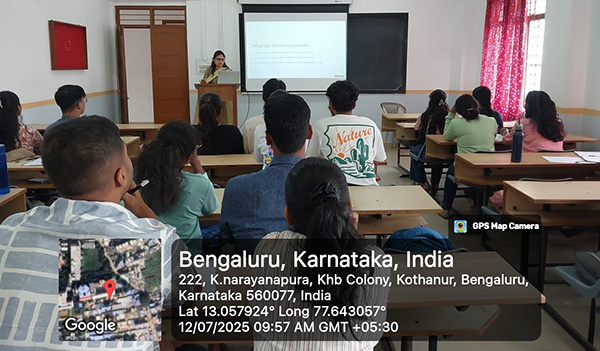
Value Added Course - Firearms and Ammunition
Date: 08 to 12 July 2025
The Department of Forensic Science organized a five-day Value Added Course on Firearms and Ammunition for III Semester B.Sc. Forensic Science Criminology Biochemistry students, offering 30 hours of focused learning in forensic ballistics. The course introduced the structure, classification, and working of standard and improvised firearms, components and types of ammunition, and methods for identifying and analyzing ballistic evidence. Students gained practical insights into the forensic handling of projectiles and cartridge cases, along with exposure to gunshot residue (GSR) analysis using both chemical and instrumental techniques. This initiative strengthened their foundational knowledge and investigative skills, aligning with the curriculum’s emphasis on experiential learning and forensic application.
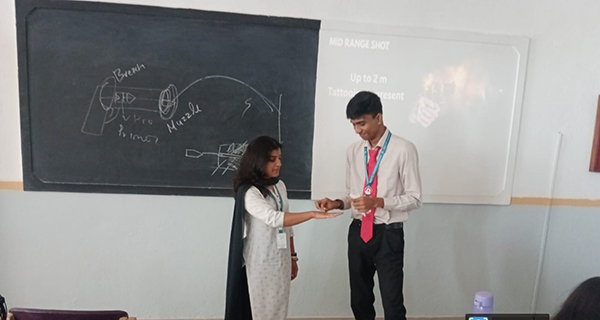
Value Added Course (VAC) on Introduction to Research Writing
Date: 08-13 August 2024
The VAC course on Introduction to Research Writing, conducted from 08/08/2024 to 13/08/2024, provided students with essential skills for effective research writing. Over 30 hours, the course covered a comprehensive range of topics where the participants were introduced to a variety of research tools, including books, journals, online databases, and virtual libraries. The session also covered different forms of academic writing such as essays, research papers, and dissertations. Students learned about the process of selecting a research topic, reviewing literature, formulating objectives, and drafting research proposals. Emphasis was placed on planning research timelines and defining the scope of study. The course also addressed the proper structuring of research documents, including citation styles like MLA and APA, and maintaining academic integrity through proper referencing and avoiding plagiarism. By incorporating these components, the course provided students with the necessary knowledge and abilities to create research articles of exceptional quality and actively participate in the academic publishing field.
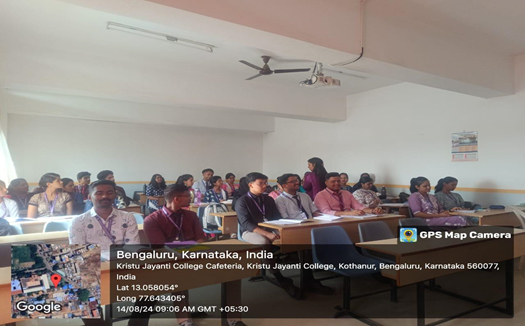
VAC course on Forensic Photography
Date: 05-09 August 2024
The Value Added Course on Forensic Photography, designed exclusively for the I Semester B.Sc. Forensic Science students, B.Sc. Forensic Science Biotechnology Biochemistry and B.Sc. Forensic Science Criminology Biochemistry streams, was a significant enhancement to the academic curriculum. The course aimed to equip aspiring forensic scientists with specialized knowledge and skills essential for the accurate documentation and analysis of crime scenes and evidence through photography.
Throughout the duration of the course, students received in-depth training on the fundamentals of photography, covering both analogue and digital cameras, including SLR and DSLR types. They explored the various parts and lenses of cameras and delved into the basic principles of both conventional and digital photography. The course also provided detailed instruction on the role of light in photography, the use of filters, and the characteristics of lenses and lens systems. Key concepts such as pixel resolution, sharpness, ISO settings, aperture, auto-focusing, auto-winding, and burst modes were comprehensively covered.
The course also emphasized the importance of composition, perspective, shutter speed, aperture, and exposure settings (Exposure Triangle) in achieving optimal photographic results. Students learned about depth of field and the factors that influence it, preparing them to produce high-quality forensic images under varying conditions.
In the second part of the course, students explored advanced photographic techniques, including photomicrography/microphotography, UV, IR, fluorescence, transmitted and oblique light photography, and close-up photography. The curriculum also included specialized topics such as trick photography, photography of bloodstains, fingerprints, imprints, and micro evidence. Students were introduced to photogrammetry, its applications, and working principles, as well as autopsy photography, surveillance photography, and crime scene photography.
Furthermore, the legal aspects of digital evidence and its admissibility were also covered, ensuring that students understood the importance of following proper protocols in forensic investigations.
The practical approach, combined with case studies, allowed students to apply their theoretical knowledge to real-world scenarios, enhancing their problem-solving skills and preparing them for the challenges they may face in their future careers. The Value Added Course successfully enriched the I Semester B.Sc. Forensic Science, B.Sc. Forensic Science Biotechnology Biochemistry and B.Sc. Forensic Science Criminology Biochemistry curriculum, empowering students with a deep understanding of forensic photography and significantly contributing to their professional development in forensic science.
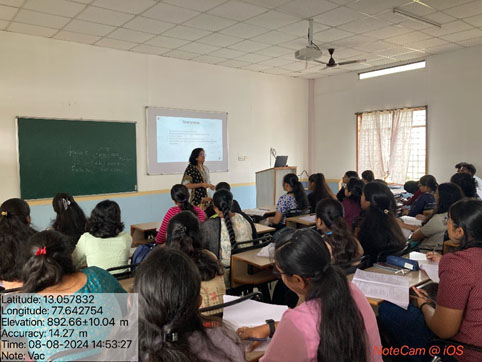
VAC course on Security and Vigilance
Date: 25-29 July 2024
The VAC course on Security and Vigilance, conducted on 25-29 July 2024, provided BSC III Semester students with essential knowledge and skills in understanding and managing security systems and vigilance practices. Spanning 30 hours, the course began with an introduction to the fundamental concepts of security, covering both Indian and international perspectives, particularly from the UK and USA. It provided a comprehensive overview of the security industry, including the theory and design of various security systems such as physical, electronic, biometric, and cybersecurity measures. The course also explored national security challenges, addressing threats like insurgency, Naxalism, terrorism, and the importance of disaster and crisis management planning. Students were introduced to the ethical considerations in surveillance, including privacy rights, and legal regulations related to security and vigilance. In the second unit, the focus shifted to vigilance, covering risk assessment, root-cause analysis, and the role of vigilance in India, including anti-corruption laws and the functioning of enforcement authorities like the CBI and Central Vigilance Commission. The course also emphasised the evaluation of security countermeasures and the importance of intelligence gathering, including open-source (OSINT), human (HUMINT), signal (SIGINT), and geospatial intelligence (GEOINT). By integrating these topics, the course equipped students with the tools needed to effectively manage and analyze security and vigilance systems.
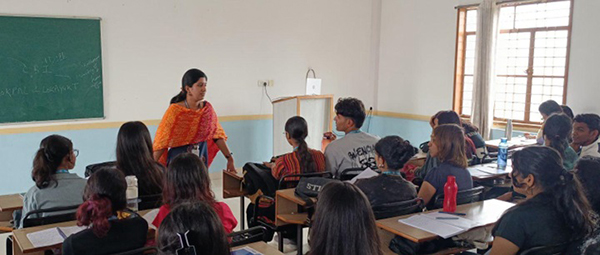
VAC course on Research and Academic Writing
Date: 23-29 July 2024
The VAC course on Research and Academic Writing, conducted from 25-29 July 2024, provided students with essential skills for effective research writing and publication. Over 30 hours, the course covered a comprehensive range of topics beginning with an overview of different academic writing types—such as essays, research papers, and theses—and the importance of research ethics, including the various forms and consequences of plagiarism. Students learned about the style and mechanics of writing, focusing on diction, tone, sentence structure, and unbiased language, alongside technical aspects like spelling, punctuation, and formatting. The course also addressed research publication, introducing students to key databases and citation metrics, such as Impact Factor and h-index, and provided practical guidance on using software tools to identify predatory journals and navigate the submission process to major publishers. By integrating these elements, the course equipped students with the knowledge and skills needed to produce high-quality research papers and effectively engage with the academic publishing landscape.
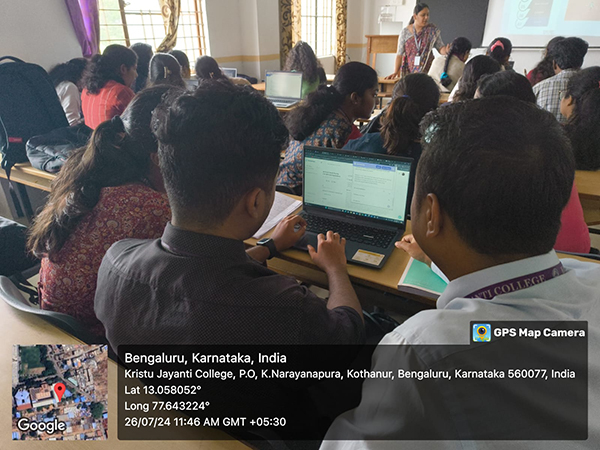
VAC- Forensic Evidence Analysis
Date: 23-29 July 2024
Kristu Jayanti College recently organized a Value Added Course on forensic evidence analysis, specifically designed for the 3rd-semester BSc Life Science students. The course was attended by 166 enthusiastic students from diverse specializations, including MBGE, BTGE, BTBC, and BTBO.
This comprehensive course aimed to introduce the students to the fundamentals of forensic science, providing them with an understanding of the various types of evidence crucial in criminal investigations. The curriculum covered key aspects such as the nature and classification of forensic evidence, the role of forensic scientists in the criminal justice system, and the techniques used in analyzing different types of evidence.
Throughout the course, students were exposed to practical insights into the handling and examination of forensic evidence, bridging the gap between theoretical knowledge and real-world applications. The sessions were designed to enhance their analytical skills and prepare them for advanced studies or careers in forensic science.
To assess the students' grasp of the subject, an examination was conducted at the end of the course. This not only evaluated their understanding but also encouraged them to critically engage with the material. The successful completion of this course has equipped the students with foundational knowledge in forensic science, paving the way for further exploration and specialization in this dynamic field
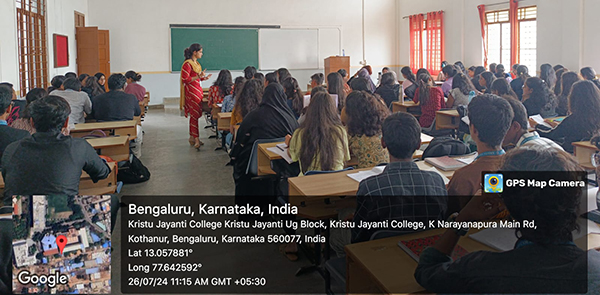
Value Added Course on Security And Vigilance
Date: 03 August 2023
For the second time, the Value Added course for second-year BSc Forensic Science students was offered offline as live sessions, and the new audience showed twice as much interest in the course as the previous one. The curriculum was updated to reflect the needs of the modern world and incorporate the most recent and emerging trends in the industry.
Security and vigilance are paramount in safeguarding individuals, assets, and information in various domains, ranging from corporate environments to public spaces.
The definition, background, and guiding concepts of security were covered. There was also discussion of the security-related industries. The models that are accessible worldwide and in India were described. The more recent ideas in package tracking and marine.
The concepts and models of vigilance that are available in India were thoroughly examined. Throughout the training, there was a thorough dive into the concept of fraud and a global awareness of vigilance. Students were given perspective through the use of case studies and prior occurrences.
The primary objective of security and vigilance, which is to proactively detect, evaluate, and reduce potential risks and hazards, was understood by the pupils.
The course served as a useful transition for the students moving from their first to their second year of study. The training received very good response.

Value Added Course on Handwriting and Signature Examination
The specialized Value Added Course focusing on Handwriting and Signature Examination, exclusively crafted for the III Semester M.Sc. Forensic Science students, has emerged as a priceless enhancement to our academic curriculum. At the heart of this unique program lies a commitment to providing our students with specialized skills and practical insights into the fascinating world of handwriting and signature examination. Delving into the intricacies of this field, the course empowered students with a comprehensive understanding of handwriting mechanics, class and individual characteristics, various types of signatures, and the distinctive features that set them apart. Moreover, students explored a myriad of software, tools, and techniques crucial for the examination of handwriting and signatures.
The essence of this course was not confined to theoretical discourse. Through a hands-on approach and engaging practical case studies, students seamlessly bridged the gap between theory and real-world application. This immersive experience not only solidified their understanding but also provided invaluable insights into the challenges awaiting them in their forthcoming careers.

Value Added Course on Fraud Examination
Date: 25/07/2023 to 31/07/2023
Fraud is a deliberate deception or manipulation, typically conducted with the intent to secure unfair or unlawful gain, or to deprive someone of a legal right. It involves the use of false representations, concealment of information, or misleading actions to deceive others for personal or financial advantage. Fraud can occur in various contexts, including business transactions, financial activities, online interactions, and legal matters.
Fraud examination holds significant importance in various contexts, including business, finance, law, and governance. The discipline of fraud examination plays a crucial role in preventing, detecting, and responding to fraudulent activities.
The Value Added Course offered by the Department of Forensic Science represented a significant opportunity for 5th-semester BSc Forensic Science students to expand their knowledge, sharpen their skills, and connect with industry professionals. We are confident that this course will contribute to their overall academic and professional development, preparing them for the challenges and opportunities in the dynamic field of forensic science.
Value Added Course on Forensic Photography
Photography stands as an independent art form, its legacy spanning centuries in various incarnations. Today, its evolution incorporates modern techniques, propelling it into a rapidly expanding field. While digital cameras have supplanted optical photography, the foundational principles endure. Its allure extends beyond mere technicality; photography serves as both a captivating hobby and a crucial scientific tool for documentation.
Within the realm of forensic science, meticulous documentation is paramount—be it at crime scenes or within laboratory settings—in the pursuit of equitable justice. The benchmarks for quality in forensic science hinge significantly on impeccable documentation standards. Photography emerges as a linchpin in this arena, a ubiquitous application essential for forensic documentation.
The first-semester BSc Forensic Science and B.Sc Biotechnology and Forensic Science (BTFS) students were given a value added course called 'Forensic Photography.' Beyond supplementing the existing curriculum, it enriches the program by imparting indispensable knowledge and skills crucial for the discipline. Also it proved to be a value addition to the curriculum offered for the programme.
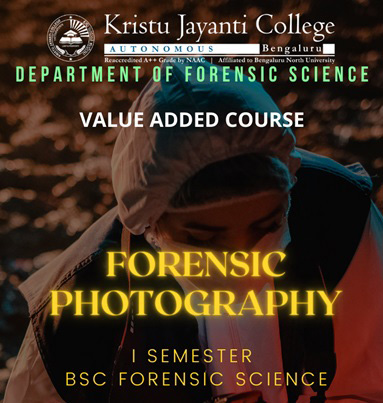
Value Added Course on 'Fraud Examination'
Date: 22/08/2022 to 27/08/2022
Fraud is the intentional use of false or misleading information in an attempt to illegally deprive another person or entity of money, property, or legal rights. In order to constitute fraud, the party making the false statement must know or believe that it is untrue or incorrect and intended to deceive the other party. Fraud may be prosecuted as both a criminal and civil offense. Criminal punishments for fraud can include a combination of prison, fines, and restitution to victims.
Fraud investigation is one stream of career which is open to forensic science graduates. The career field comprises of interesting entities like detection, whistle-blowing, auditing and investigation. With this in mind, a Value Added Course titled ‘Fraud Examination’ was offered to the first semester MSc Forensic Science students. The course was handled by the programme teachers and was split in two units. The students could get a first hand understanding of the field by the case studies and discussion through the VAC.
The course also enhanced the broadening of scope of the field of forensic science and offered a newer perspective to the students.
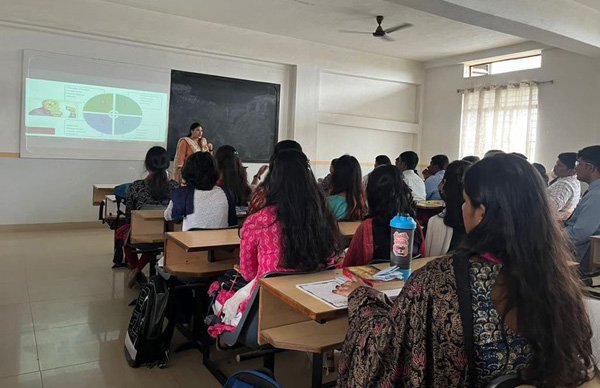
Capacity building - Training on Life skills for first year MSc Forensic Science students
Date: 18/08/2022 to 20/08/2022
The Department of Forensic Sciences, Kristu Jayanti College Autonomous, organized a Skill Enhancement course on “Capacity Building Training On Life Skills”, from 18/08/2022 to 20/08/2022 for the first-year students of M.Sc. FS. The numbers of beneficiaries were 40 students. The audience was addressed by Faculty members of the Department of Forensic Science, Kristu Jayanti College will be addressing the students.
The Skill Enhancement Course focused on abilities for adaptive and positive behavior that enable individuals to deal effectively with the demands and challenges of everyday life. Life skills are behaviors that enable individuals to adapt and deal effectively with the demands and challenges of life. There are many such skills, but the WHO has enlisted 10 core life skills which are necessary for healthy, mindful, and happy living. The life skills enrichment sessions covered all the 10 core life skills designated by the WHO. The students were briefed on the importance of making rational decisions and to be able to explore alternatives. The interactive activities conducted by faculties gave an idea about the need and use of Life Skills in daily life.
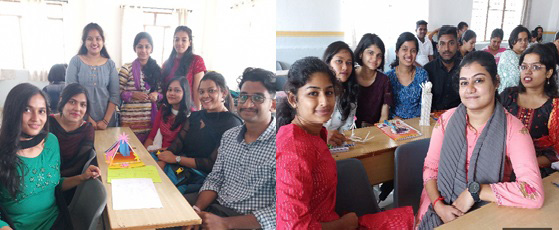
Value Added Course on 'Forensic Photography'
Date: 16/08/2022 to 24/08/2022
Photography is an art by itself. It is a field used by mankind for many centuries in different forms. Present day photography utilises modern techniques and is a vastly growing field. The use of digital cameras have replaced the use of optical photography but still the principles are the same. This field is a interesting field as a hobby as well as scientifically used for documentation.
The field of forensic science requires proper documentation of the scene of crime as well laboratory events in pursuit of free and fair justice. The documentation standards are a major quality benchmark in forensic science. The use of photography is a mainstream application in forensic documentation. Therefore it is imperative for forensic trainers to understand the phenomena and principles of photography. In addition there needs to be an awareness as to how the art of photography must be put to use in order to ensure that reasonable doubt cannot be raised in this documentation procedure.
A Value Added Course titled ‘Forensic Photography’ was offered to the first semester BSc Forensic Science students. This course proved to be a bridge between their academic years. Also it proved to be a value addition to the curriculum offered for the programme.

Capacity building - Training on Life skills for first year BSc Forensic Science students
Date: 10/08/2022 to 12/08/2022
The Department of Forensic Sciences, Kristu Jayanti College Autonomous, had organized a Skill Enhancement course on “Capacity Building Training On Life Skills”, from 10/08/2022 to 12/08/2022 for the first year students of B.Sc. FS. The numbers of beneficiaries were 120 students. The audience was addressed by Faculty members of Department of Forensic Science, Kristu Jayanti College will be addressing the students.
The Skill Enhancement Course focused on abilities for adaptive and positive behavior that enable individuals to deal effectively with the demands and challenges of everyday life. Life skills are behaviors that enable individuals to adapt and deal effectively with the demands and challenges of life. There are many such skills, but the WHO has enlisted 10 core life skills which are necessary for healthy, mindful and happy living. The life skills enrichment sessions covered all the 10 core life skills designated by the WHO. The students were briefed on the importance of making rational decisions and to be able to explore alternatives. The interactive activities conducted by faculties gave an idea about the need and use of Life Skills in daily life.
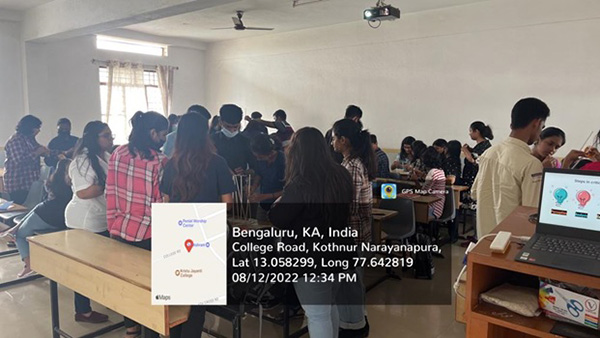
Value Added Course on Security and Vigilance
Date: 2nd to 11th August 2022
The Value Added course offered for the second year BSc Forensic Science students was offered offline as live sessions for the first time after relaxation from the hindrances caused by the pandemic. The curriculum was revised to fit the demands of the present world and included newer and upcoming trends in the field.
Security – the meaning, history and principles were discussed. The industries specific to the field of security was also touched on. The models available in India as well as globally were explained. The newer concepts of maritime and package tracking systems were also explained in the unit.
Vigilance – the concepts and models available in India were dealt with in depth. Global understanding of vigilance, the concept of fraud was also delved deep during the course. Case studies and previous instances were used to give perspective to students.
The course was a helpful bridge the students from first year into the second year of studies. The feedback to the course was overwhelmingly positive.

Value Added Course on Security and Vigilance
Date: 9th to 18th August 2021
Security is a concept which mankind has always strived to have as a society. We provide secure households, townships and nations through some existing systems and concepts which may sometimes go unnoticed. Security is also inter-twined with a crime-free society and the criminal justice system. Forensic application in security is a major branch while designing security systems.
Vigilance is a monitoring system which aids in provision of secure society at large. Both public and private sector maintain vigilance systems to ensure security is provided to the most distant person from mainstream. Forensic application for vigilance and criminal justice measures are available for this process.
A value-added-course titled ‘Basics of security and vigilance’ was provided to the students of III semester BSc Forensic Science students. The students were taught the basic concepts, principles, establishments and tools available for security and vigilance both in India and in other parts of the world. Students also got a chance to understand the application of forensic science in these two branches and could be acquainted with employability in these fields.

Value Added Course on Security and Vigilance
Date 3rd to 14th August 2020
As a Value Added Course, to the students pursuing second year BSc Forensic Science, the Unit of Forensic Science under the Department of Life Sciences felt it necessary to offer a domain specific value added course. The basics of Security and Vigilance was a topic of interest in the recent days and one that generat3ed lot of interest academically and professionally. Therefore, the course titled Security and Vigilance was offered. The curriculum was planned in such a way keeping all the broad details included and having a professional quotient in the curriculum. Students found the course interesting as well as valuable in their future outlook. Due to the pandemic the event was organised online through the zoom platform. The subject was handled by the department teachers. The course was divided into two units – security and vigilance and had both Indian and global perspectives and organisations included in the syllabus.


